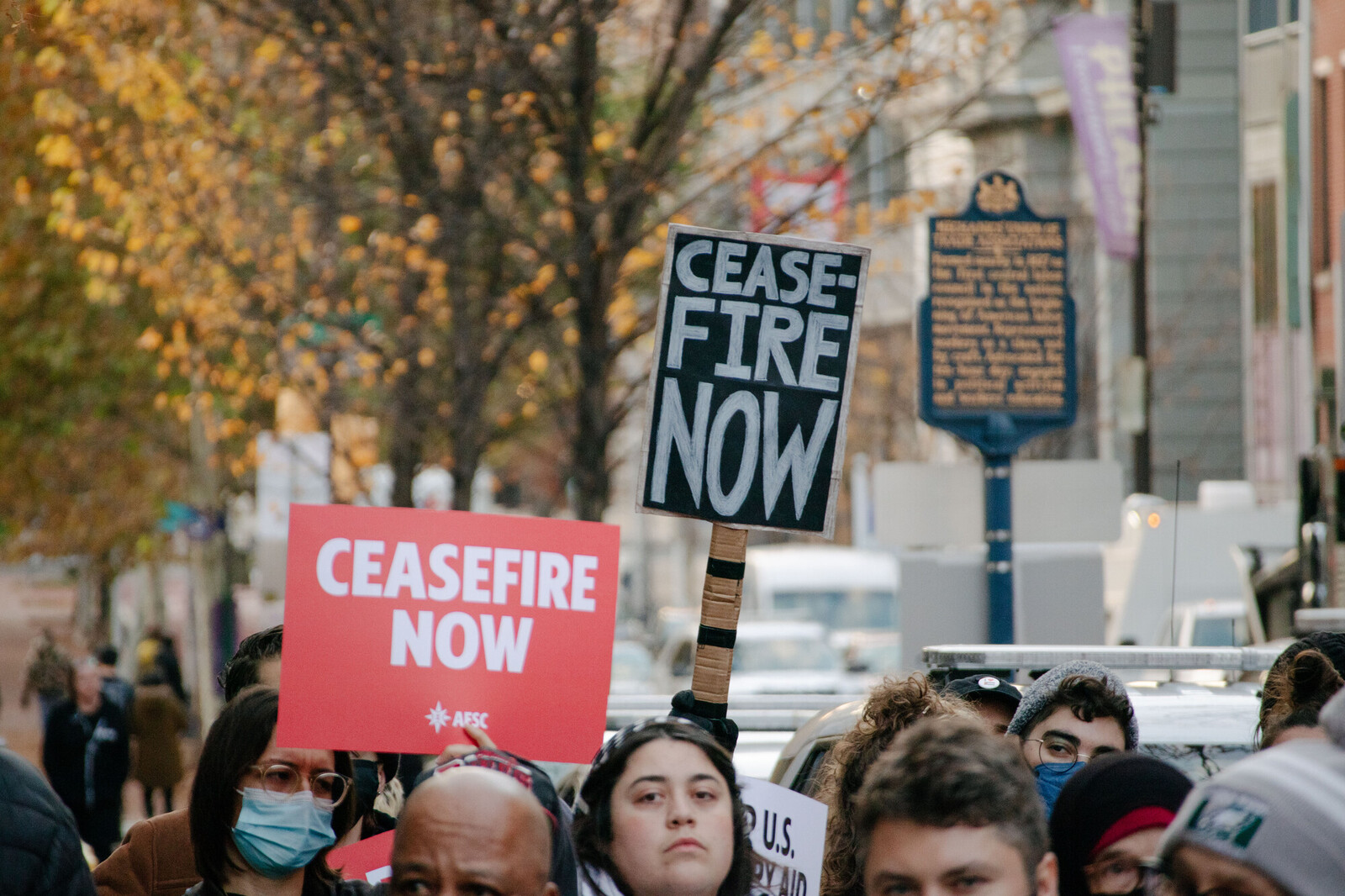
Protest in Philadelphia. Photo: Rachael Warriner
After 15 months of genocide in Gaza, a cease-fire deal was finally reached. We celebrate the cease-fire deal, even if it comes far too late.
As a Quaker organization with a deep commitment to peace, justice, and human dignity, AFSC has provided humanitarian aid to Palestinians in Gaza while joining with many others around the globe in calling for a just and sustainable peace. Though this agreement temporarily halts the killing, it is not a permanent cease-fire. Today, we must keep up our advocacy to prevent Israeli attacks from resuming.
1. The deal includes a six-week cease-fire and the release of Palestinian and Israeli captives as negotiations continue.
The agreement puts in place a six-week halt in military actions starting Jan. 19. During that period, the Israeli army must withdraw and dismantle military posts, and forcibly displaced Palestinians should be able to return to their homes. Hamas will release 33 of the Israeli citizens they are holding in Gaza. Israel will release between 30 to 50 Palestinians held in Israeli prisons for every Israeli released. Israel has also agreed to allow 600 trucks of humanitarian aid into Gaza every day, including 60,000 temporary homes and 200,000 tents.
On day 16, Feb. 3, Israel and Hamas will resume negotiations for a potential second phase of a six-week pause of military operations and further release or exchange of captives. The goal would be to declare a permanent cease-fire during the second six-week pause.
2. Sustained advocacy is needed to maintain the cease-fire.
One major obstacle has been the disconnect between Hamas’ demand for a permanent cease-fire while Israel would only accept a temporary pause for the release of hostages. While this agreement is a critical first step toward peace in the region, the U.S. and other countries must abide by their obligations under international law and commit to ensuring a permanent and unconditional cease-fire. That should apply not only in Gaza but the region, including all of Palestine, Lebanon, Syria, and Yemen.
To achieve a just cease-fire agreement, Israel must comply with international law not just in Gaza but also in the West Bank. A cease-fire in Gaza cannot be treated as a trade-off for expansion and violence elsewhere in Palestine. Impunity is incompatible with justice and peace; all parties must also be held accountable for violations of international law wherever they occur.
In Lebanon, Israel has violated the cease-fire terms at least 100 times without consequence. This is unacceptable and should not be allowed in Lebanon, Gaza, or anywhere else in the region. Continued pressure is needed to ensure the terms of the cease-fire deal are followed and, ultimately, reach a long-term political solution that brings an end to forced displacement, occupation, and apartheid over the Palestinian people and peace to the whole region.
3. The cease-fire deal is only the starting point.
In addition to a permanent end to the violence, we must keep our advocacy to ensure:
- Guarantee and facilitate the reopening of all crossings for immediate, full, safe, and unimpeded humanitarian access to Gaza to alleviate famine, deliver lifesaving medical aid, and provide essential goods and services to meet the widespread needs of the population.
- A complete withdrawal of the Israeli military from Gaza, a Palestinian-led process to determine Gaza’s future, and a fully funded just reconstruction.
- Free movement for Palestinians within the entire occupied Palestinian territory and an end to the nearly two-decade-long siege imposed on Gaza.
- Palestinian self-determination and an end to occupation, forced displacement, and apartheid imposed on Palestinians in all parts of Palestine and abroad by guaranteeing the right of return of Palestinian refugees.
- Demand and ensure the immediate reversal of both pieces of Israeli legislation that prohibit UNRWA from operating inside the occupied Palestinian territory, respecting UNRWA’s mandate.
4. Genocide and other war crimes must be investigated.
Over the past 15 months, at least 46,000 Palestinians have been killed. That number is expected to rise as those buried under the rubble are identified and investigations commence. Major human rights organizations—including Amnesty International and Human Rights Watch—and U.N. special rapporteurs have said that Israel’s actions in Gaza constitute genocide. They have also said that attacks on hospitals, schools, aid stations, and other protected spaces constitute grave breaches of international law and human rights law, including war crimes and crimes against humanity.
There must be accountability for the atrocities committed. A transparent, impartial investigation of these violations of international law is essential, requiring unrestricted access to Gaza for media, human rights organizations, U.N. investigators, and others to document and help ensure accountability.
In the days, weeks, and months ahead, Palestinians in Gaza will return to where their homes and communities to find much of what they knew destroyed. It falls to all of us who watched this destruction from afar to help rebuild and to ensure dignity and freedom are restored for all Palestinians.
We hope you will continue to join us in the long road ahead to making this a reality.
